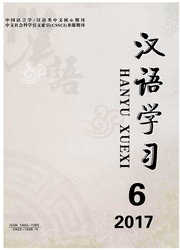

 中文摘要:
中文摘要:
“一味”是现代汉语中较为常见的情态副词,表示不改变且一直持续某种行为或状态,在“凡事都要适度”这一社会认知心理的促动下产生“过犹不及”的衍推义,进而表达说话人对过量VP的否定态度。当说话人要凸显其否定态度时,还可以在“一味X”的前后出现其他显性/隐性的否定性词语,进而强化其否定态度。从句法上看,“一味”一般修饰双音节或多音节的谓词性成分,且谓词性词语在语义上要具有[+可控]的语义特征,其所在的小句主语也常由生命度等级较高的主体来充当。在语用上,“一味”跟限定词“只、只是”有较明显的共现倾向,且倾向出现在假设复句的前分句中。
 英文摘要:
英文摘要:
The modal adverb "yiwei" is a very common word in modern Chinese, which means to keep a certain behavior or a certain state continuously without any change, and expresses the speaker's negative attitude towards excessive VP in the context of"going too far is as bad but going far enough" produced by the social cognitive psychology of "moderation in all things". When the speaker wants to highlight its negative attitude, it can also appear other dominant or recessive negative words in front or back of "yiwei X", and then strengthen their negative attitude. In the term of syntax, it often modifies the predicate components of the double or multiple syllable, and the modified should be controllable in semantic meaning. In addition, the subject of the clause "yiwei X" is often served by the living subject of higher degree. In pragmatics, that has a tendency of with the qualified word "zhi" and "zhishi" obviously, which tends to appear in the first clauses of hypothetical complex sentences
 同期刊论文项目
同期刊论文项目
 同项目期刊论文
同项目期刊论文
 期刊信息
期刊信息
